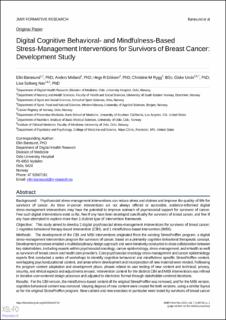| dc.contributor.author | Børøsund, Elin | |
| dc.contributor.author | Meland, Anders | |
| dc.contributor.author | Eriksen, Hege Randi | |
| dc.contributor.author | Rygg, Christine Marie | |
| dc.contributor.author | Ursin, Giske | |
| dc.contributor.author | Nes, Lise Solberg | |
| dc.date.accessioned | 2024-01-04T16:26:32Z | |
| dc.date.available | 2024-01-04T16:26:32Z | |
| dc.date.created | 2023-09-20T17:43:47Z | |
| dc.date.issued | 2023 | |
| dc.identifier.citation | JMIR Formative Research. 2023, 7(2023), Artikkel e48719. | en_US |
| dc.identifier.issn | 2561-326X | |
| dc.identifier.uri | https://hdl.handle.net/11250/3109908 | |
| dc.description | This is an open-access article distributed under the terms of the Creative Commons Attribution License (https://creativecommons.org/licenses/by/4.0/), which permits unrestricted use, distribution, and reproduction in any medium,provided the original work, first published in JMIR Formative Research, is properly cited. The complete bibliographic information, a link to the original publication on https://formative.jmir.org, as well as this copyright and license information must be included. | en_US |
| dc.description.abstract | Background: Psychosocial stress-management interventions can reduce stress and distress and improve the quality of life for survivors of cancer. As these in-person interventions are not always offered or accessible, evidence-informed digital stress-management interventions may have the potential to improve outreach of psychosocial support for survivors of cancer. Few such digital interventions exist so far, few if any have been developed specifically for survivors of breast cancer, and few if any have attempted to explore more than 1 distinct type of intervention framework.
Objective: This study aimed to develop 2 digital psychosocial stress-management interventions for survivors of breast cancer; 1 cognitive behavioral therapy-based intervention (CBI), and 1 mindfulness-based intervention (MBI).
Methods: The development of the CBI and MBI interventions originated from the existing StressProffen program, a digital stress-management intervention program for survivors of cancer, based on a primarily cognitive behavioral therapeutic concept. Development processes entailed a multidisciplinary design approach and were iteratively conducted in close collaboration between key stakeholders, including experts within psychosocial oncology, cancer epidemiology, stress-management, and eHealth as well as survivors of breast cancer and health care providers. Core psychosocial oncology stress-management and cancer epidemiology experts first conducted a series of workshops to identify cognitive behavioral and mindfulness specific StressProffen content, overlapping psychoeducational content, and areas where development and incorporation of new material were needed. Following the program content adaptation and development phase, phases related to user testing of new content and technical, privacy, security, and ethical aspects and adjustments ensued. Intervention content for the distinct CBI and MBI interventions was refined in iterative user-centered design processes and adjusted to electronic format through stakeholder-centered iterations.
Results: For the CBI version, the mindfulness-based content of the original StressProffen was removed, and for the MBI version, cognitive behavioral content was removed. Varying degrees of new content were created for both versions, using a similar layout as for the original StressProffen program. New content and new exercises in particular were tested by survivors of breast cancer and a project-related editorial team, resulting in subsequent user centered adjustments, including ensuring auditory versions and adequate explanations before less intuitive sections. Other improvements included implementing a standard closing sentence to round off every exercise, and allowing participants to choose the length of some of the mindfulness exercises. A legal disclaimer and a description of data collection, user rights and study contact information were included to meet ethical, privacy, and security requirements.
Conclusions: This study shows how theory specific (ie, CBI and MBI) digital stress-management interventions for survivors of breast cancer can be developed through extensive collaborations between key stakeholders, including scientists, health care providers, and survivors of breast cancer. Offering a variety of evidence-informed stress-management approaches may potentially increase interest for outreach and impact of psychosocial interventions for survivors of cancer. | en_US |
| dc.language.iso | eng | en_US |
| dc.subject | app | en_US |
| dc.subject | cancer | en_US |
| dc.subject | cognitive behavioral therapy | en_US |
| dc.subject | digital | en_US |
| dc.subject | eHealth | en_US |
| dc.subject | mHealth | en_US |
| dc.subject | mindfulness | en_US |
| dc.subject | stress management | en_US |
| dc.subject | usability | en_US |
| dc.subject | user-driven development | en_US |
| dc.title | Digital cognitive behavioral- and mindfulness-based stress-management interventions for survivors of breast cancer: Development study | en_US |
| dc.type | Peer reviewed | en_US |
| dc.type | Journal article | en_US |
| dc.description.version | publishedVersion | en_US |
| dc.rights.holder | © 2023 Elin Børøsund, Anders Meland, Hege R Eriksen, Christine M Rygg, Giske Ursin, Lise Solberg Nes | en_US |
| dc.source.pagenumber | 12 | en_US |
| dc.source.volume | 7 | en_US |
| dc.source.journal | JMIR Formative Research | en_US |
| dc.identifier.doi | 10.2196/48719 | |
| dc.identifier.cristin | 2177302 | |
| dc.description.localcode | Institutt for idrett og samfunnsvitenskap / Department of Sport and Social Sciences | en_US |
| dc.source.articlenumber | e48719 | en_US |
| cristin.ispublished | true | |
| cristin.fulltext | original | |
| cristin.qualitycode | 1 | |
